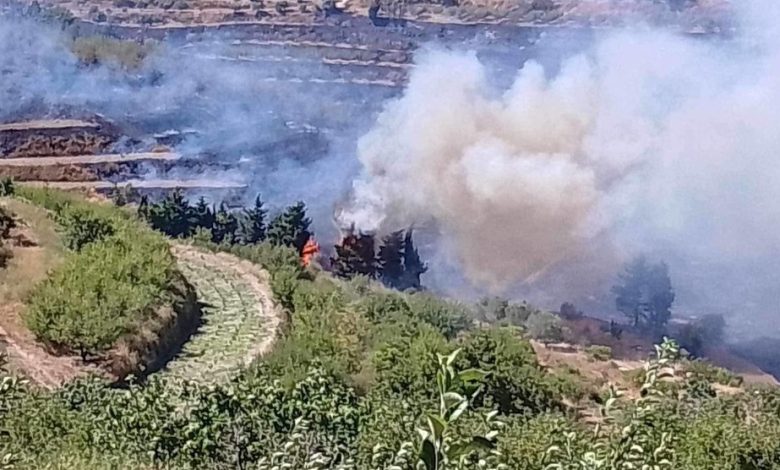The forest fires crisis in Syria threatens the fate of farmers
How do forest fires crisis in Syria threaten the fate of farmers?

The ongoing crisis in Syria, which has been going on for a decade, has continued to cause suffering for the Syrian people due to wars and political crises, leading to internal displacement.
Recently, Syria has improved its situation due to its reengagement with Arab regimes and its return to the Arab fold. However, what happened was not expected by the Syrian people as climate change has shattered the dreams of farmers in Syria, especially with the outbreak of forest fires that have destroyed agricultural crops.
Forest Fires and Rising Temperatures
Syria continues to suffer from the consequences of rising temperatures, as the Middle East region enters the heat dome. Temperatures have reached 40 degrees Celsius in the city of Homs and 39 degrees Celsius in the capital, Damascus, making it difficult for families to cool down without frequent electricity cuts.
As a result, raging forest fires have broken out in various rural areas in the central part of the country, with temperatures reaching 40 degrees Celsius in some regions. Syrian firefighters are working to extinguish the fires.
Amjad Hamad, the head of the local forest protection center, stated in a press statement that a fire broke out in a public agricultural land in Hama province in the central part of the country, and firefighting teams are working to prevent its spread to surrounding areas.
In addition, the head of the civil defense in the region mentioned that another fire broke out in agricultural areas in the neighboring Homs province. He added that the civil defense teams are facing difficulties in containing the fire due to the rugged mountainous terrain.
Farmers’ Crisis
As the wheat harvest season approaches in the Damascus countryside and across Syria, farmers are facing difficult conditions due to the fires that have consumed their crops.
The cost of agriculture this year has exceeded half a million Syrian pounds, approximately 65 dollars, and some estimate it to be double this amount. This, in addition to the costs of wages and harvesting operations, has forced many farmers to abandon their land or stop cultivating crops that require significant long-term effort, such as wheat, and shift towards easier and less costly crops.
The wheat production in Syria, which used to reach four million tons annually before the war, has decreased by nearly 75% in recent years due to unfavorable weather conditions.
Sherif Shahada, a Syrian political analyst, stated that Syria is experiencing an extremely hot summer with almost no means to confront or mitigate its effects, especially in terms of electricity and all forms of energy.
He emphasized that the suffocating electricity crisis has had a real and devastating impact on the lives of Syrians, and the heat has consumed the wheat crop that the Syrian people rely on.
He added that all productive sectors, whether industrial, agricultural, artisanal, or tourism-related, as well as all service activities, have been affected. The earthquake catastrophe that hit Syria, despite the appreciated Arab and international assistance, has further increased the difficulties and put significant pressure on the already devastated Syrian economy, compounded by the destruction it has suffered and the sanctions that have paralyzed its movement. This increases the levels of despair and frustration among the Syrian citizens.












